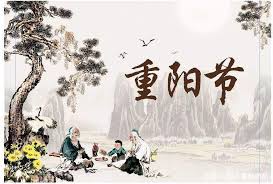The Double Ninth Festival: A Celebration of Respect and Longevity

As the cool autumn breeze sweeps across China, people gather to celebrate the Double Ninth Festival (Chóngyáng Jié), a traditional holiday steeped in history and warmth. Falling on the 9th day of the 9th lunar month—this year on October 29, 2025—this festival honors elderly relatives, embraces nature’s beauty, and carries forward age-old customs. Let’s explore how this ancient tradition comes alive in modern China.
Roots of the Festival: Numbers and Legends
The festival’s name comes from the Chinese word for “nine” (jiǔ), which sounds like the word for “longevity” (jiǔ). Ancient Chinese philosophy viewed nine as a powerful “yang” (positive) number, and double nines symbolize strength and good fortune. One legend tells of a hero who climbed a mountain and drank chrysanthemum wine to protect his family from disaster—a story that gave rise to today’s traditions of climbing mountains and enjoying chrysanthemum flowers.
Traditional Customs: A Blend of Nature and Respect
For centuries, Chinese people have marked the Double Ninth Festival with meaningful rituals:
Climbing Mountains: Families hike to high places to “ascend toward good luck.” The fresh autumn air and panoramic views make this a beloved outdoor activity.
Admiring Chrysanthemums: These golden flowers bloom in late autumn and represent longevity. People display chrysanthemums, drink chrysanthemum tea, or even make wine from the petals.
Honoring Elders: Since 1989, the Double Ninth Festival has also been China’s official Senior Citizens’ Day. Younger generations visit grandparents, give gifts, or simply spend time chatting over home-cooked meals.
Modern Celebrations: Tradition Meets Community
In 2025, cities and villages across China celebrated with creative, heartwarming events that blend old and new:
1. Acts of Kindness for Seniors
In Fuyang, Zhejiang Province, students and volunteers gathered to weave scarves, bake traditional pastries, and take portrait photos for elderly residents. “These small gifts carry big love,” said a local teacher. Similarly, in Taian, Shandong, communities hosted free health check-ups, folk music performances, and craft workshops, drawing over 500 seniors.
2. Intergenerational Connection
In Changsha, Hunan, volunteers at Xingcheng Nursing Home taught seniors to make “fortune character” rubbings (a traditional art form). “The young people treated us like family,” said 78-year-old Grandma Wang. In Weifang, Shandong, kindergartners sang songs and presented hand-drawn cards to elders, bridging generations through laughter.
3. Tech and Care for a New Age
Cities like Beijing showcased how technology enhances elderly life. At养老服务中心 (elderly care centers), seniors tried smart health monitors and emergency call devices. “We want to help older adults live independently and safely,” explained a Beijing official. Meanwhile, in Suzhou, Jiangsu, communities set up tool-lending stations where seniors can borrow walkers or wheelchairs for free.
Why It Matters: Family, Respect, and Harmony
The Double Ninth Festival is more than just a day off—it’s a reminder of China’s core values: filial piety (respect for parents and elders) and community care. In a fast-paced world, it encourages people to slow down, cherish family bonds, and support those who’ve lived long lives. As one volunteer in Shaanxi put it: “Old age is a treasure. Celebrating them is celebrating life itself.”
Join the Celebration!
How would you honor the elders in your life? Maybe call a grandparent, share a meal with an older neighbor, or try making chrysanthemum tea. The Double Ninth Festival teaches us that respect and love are the greatest gifts—timeless values that cross all cultures.
Happy Double Ninth Festival!
Key Vocabulary:
长寿Longevity (chángshòu): long life
菊花Chrysanthemum (júhuā): a type of flower that blooms in autumn
孝道Filial piety (xiàodào): respect and care for parents and elders
尽孝Elderly care (jìnglǎo): looking after older people
阳Yang (yáng): positive energy in Chinese philosophy
全景图Panoramic views (quánjǐng tú): wide views of an area
志愿者Volunteers (zhìyuànzhě): people who work for free to help others
民乐Folk music (mín yuè): traditional music from a local area
